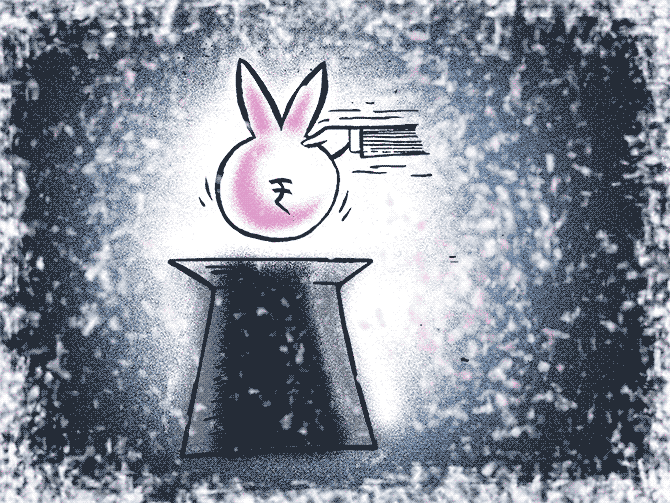The rise in bond yields would make it difficult for banks to pass on rate cuts as except for retail loans, most of their legacy portfolio are linked to marginal cost based lending rate, which takes into consideration bond yields.
Illustration: Dominic Xavier/Rediff.com

The domestic 10-year bond yields spiked following cues from the US bond market, where yields rose to a month’s high and oil prices firmed up.
The domestic 10-year bond closed at 6.68 per cent, from its Monday’s close of 6.58 per cent.
The market was closed on Tuesday due to a religious holiday.
“The rise is due to overseas yields firming up, otherwise there is no fresh domestic factor,” said a senior bond trader.
There was a little bit concern about the finance minister talking about lowering goods and services tax (GST) on automobiles, which could potentially push up borrowing here in the domestic market, said the dealer.
However, the domestic mood was set by the movement in US bond yields.
The 10-year US bond yield rose 7.4 basis points to 1.706 per cent, its highest since August 9.
In the last two trading sessions bond yields in the US has risen 15 basis points.
The 30-year bond yields also rose by a similar margin.
Meanwhile oil prices also firmed up as shale productivity weakened.
Brent crude rose 0.55 per cent to $62.77 a barrel, rising more than 7 per cent in this month.
The rise in bond yields would make it difficult for banks to pass on rate cuts as except for retail loans, most of their legacy portfolio are linked to marginal cost based lending rate, which takes into consideration bond yields.
Bond yields in India have fallen after the Reserve Bank of India (RBI) cut policy rates by 110 basis points since February.
Economists expect the RBI to cut another 40 basis points cut in repo rate, but the present yields have largely factored in such a possible move.
Therefore, analysts say, if the policy rates are not pared, bond yields would likely climb even as liquidity is comfortable now and in surplus of over Rs 1 trillion.
The 10-year bond yield was 8.18 per cent a year ago, while it closed at 6.68 per cent on Wednesday.












 © 2025
© 2025